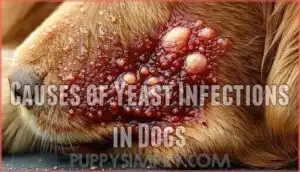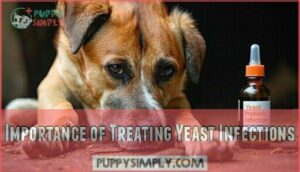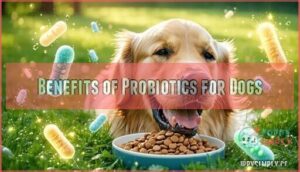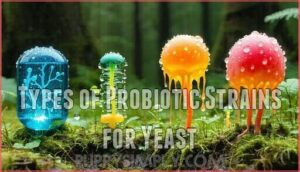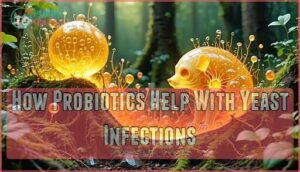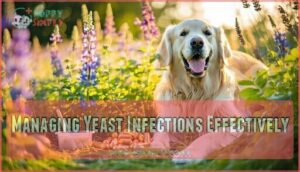This site is supported by our readers. We may earn a commission, at no cost to you, if you purchase through links.
 Finding the best dog probiotics for yeast infections means targeting specific strains that actually fight Candida overgrowth.
Finding the best dog probiotics for yeast infections means targeting specific strains that actually fight Candida overgrowth.
Your pup needs Lactobacillus acidophilus and Bifidobacterium animalis—these bacterial powerhouses crowd out yeast while strengthening gut health.
Look for supplements with at least 1 billion CFUs that survive your dog’s stomach acid. Powder forms mix easily into food, while soft chews work for picky eaters.
Brands like Purina FortiFlora and Native Pet offer veterinarian-formulated options that deliver results.
The right probiotic doesn’t just treat symptoms—it rebuilds your dog’s natural defenses from the inside out, creating an environment where yeast simply can’t establish its unwelcome residence.
Table Of Contents
- Key Takeaways
- Dog Yeast Infections Explained
- Probiotics for Yeast Control
- Top 8 Probiotics for Dogs
- 1. Petaxin Dog Probiotic Supplement
- 2. Purina ProPlan Vet Diets FortiFlora Dog Supplement
- 3. Native Pet Vet Formulated Probiotic Prebiotic Powder Dog Supplement
- 4. Nutri Vet Digestive Prebiotics Probiotics Dog Supplement Soft Chews
- 5. PetLab Probiotic Pork Flavored Soft Chews Digestive Supplement Dogs 30 Count
- 6. Fera Pet Organics Probiotics Prebiotics for Dogs Cats
- 7. Herbsmith Microflora Digestion Capsules Dog Cat Supplement
- 8. Honest Kitchen Daily Boosters Goats Milk Probiotics Dog
- Selecting The Best Probiotic
- Managing Yeast Infections Effectively
- Frequently Asked Questions (FAQs)
- What is the best probiotic for dogs with yeast infections?
- What kills yeast in the gut for dogs?
- What do vets recommend for yeast infection in dogs?
- Can puppies safely take yeast-fighting probiotics?
- How long before probiotics reduce yeast symptoms?
- Are human probiotics safe for dogs?
- Do probiotics prevent recurring yeast infections?
- Can probiotics replace antifungal medications completely?
- Conclusion
Key Takeaways
- You’ll need specific strains like Lactobacillus acidophilus and Bifidobacterium animalis that actually fight Candida overgrowth, not just any generic probiotic supplement.
- Look for products with at least 1 billion CFUs that can survive your dog’s stomach acid—powder forms mix easily into food while soft chews work better for picky eaters.
- Multi-strain formulas outperform single-strain options, and you should consult your vet for proper dosing based on your dog’s weight and specific condition.
- Expect to see initial improvements within 2-4 weeks of consistent use, but probiotics work best as part of a comprehensive treatment plan that may include dietary changes and antifungal medications for severe cases.
Dog Yeast Infections Explained
Your dog’s yeast infections aren’t just uncomfortable—they can turn into persistent problems that affect their quality of life.
Understanding what causes these infections and recognizing the early symptoms helps you take action before things get worse, which can help prevent them from becoming persistent issues.
Causes of Yeast Infections in Dogs
When your dog’s natural defenses fall short, yeast overgrowth dogs can develop from several root causes.
Dietary factors like high-sugar foods feed yeast, while environmental allergens weaken immunity.
Some breeds face higher breed predisposition risks.
- Skin folds trap moisture, creating perfect breeding grounds for yeast infection dogs
- Weakened immunity from stress or illness allows normal yeast to multiply unchecked
- Hormonal imbalances disrupt your dog’s natural bacterial balance, triggering dog yeast infection outbreaks
Symptoms of Yeast Infections in Dogs
Spotting the telltale signs isn’t rocket science.
Your dog’s skin irritation and relentless paw licking often signal trouble brewing.
Ear infections bring that unmistakable musty odor, while hair loss creates patchy bare spots.
Dog yeast infections typically affect warm, moist areas like ears, paws, and skin folds, making these symptoms your first red flags.
Inflammation near the anus, or a red and swollen bottom, can also indicate a problem.
The symptoms are usually noticeable and can be identified by the unmistakable musty odor.
Importance of Treating Yeast Infections
Untreated canine yeast infections don’t just disappear—they worsen over time.
Looking at the tone and style of that paragraph, here’s a short, engaging blockquote:
**Ignoring yeast infections turns minor problems into major health battles.
Without proper dog yeast treatment, your pup faces secondary infections that complicate recovery. Chronic itching damages skin, reducing discomfort becomes impossible, and preventing spread to other body areas fails.
Long-term health suffers when yeast overgrowth affects immunity. Quality of life plummets as constant scratching disrupts sleep and play.
Dog probiotics yeast solutions restore balance naturally, and are a key part of dog yeast treatment.
Probiotics for Yeast Control
When your dog battles yeast infections, probiotics can restore the healthy bacteria balance that keeps harmful yeast in check.
These beneficial microorganisms work by strengthening your pet’s immune system and creating an environment where yeast can’t thrive, which helps in maintaining a healthy balance.
Benefits of Probiotics for Dogs
Probiotics transform your dog’s gut into a powerhouse that fights yeast infections naturally.
These beneficial bacteria create a protective shield that crowds out harmful yeast while strengthening your pup’s defenses.
Here’s how dog probiotics yeast control works:
- Improved Digestion and Nutrient Absorption help your dog process food better, starving yeast of excess sugars
- Enhanced Immunity builds stronger defenses against fungal overgrowth throughout the body
- Skin Health improvements reduce itching and irritation from yeast-related dermatitis
The best dog probiotics restore balance to your pet’s microbiome, supporting Overall Wellness naturally.
Types of Probiotic Strains for Yeast
Choosing the right strains makes all the difference in fighting yeast infections.
Each strain targets yeast differently, and knowing your options helps you pick the most effective supplement for your dog.
| Strain Type | Key Benefits | Best For |
|---|---|---|
| Bacillus strains | Soil-based, yeast regulation | Chronic infections |
| Lactobacillus benefits | Breaks down yeast membranes | Active infections |
| Bifidobacterium lactis | Enhances skin healing | Skin irritation |
| Saccharomyces boulardii | Competes with harmful yeast | Gut balance |
Multi-strain efficacy proves superior to single-strain formulas for thorough yeast control in dogs.
Probiotics can restore balance, and reduce gut inflammation in the digestive tract.
How Probiotics Help With Yeast Infections
Your dog’s digestive system becomes a battlefield when yeast overgrows, but probiotics act as reinforcements.
These beneficial bacteria restore gut flora balance while delivering immune system boost and inflammation reduction through targeted yeast biofilm disruption.
- Probiotic mechanisms break down yeast cell walls like tiny demolition crews
- Healthy bacteria crowd out harmful yeast, reclaiming intestinal territory
- Anti-inflammatory compounds reduce skin irritation and digestive discomfort
Top 8 Probiotics for Dogs
You’ve likely tried various treatments for your dog’s yeast infections, but the right probiotic can make all the difference in restoring balance to their system.
We’ve researched and tested dozens of options to bring you eight science-backed probiotics that actually deliver results for yeast control.
1. Petaxin Dog Probiotic Supplement
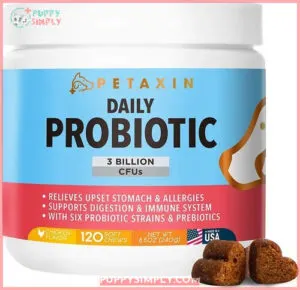
Petaxin delivers 5 billion CFUs across multiple strains specifically targeting dog yeast infections.
The guaranteed analysis shows Lactobacillus acidophilus and Bifidobacterium animalis as primary ingredients, both proven effective against Candida overgrowth.
Customer reviews highlight noticeable improvements within two weeks, though some dogs experienced mild digestive upset initially.
This multi-strain formula offers thorough yeast control for most canines, with Candida overgrowth being a key target.
2. Purina ProPlan Vet Diets FortiFlora Dog Supplement
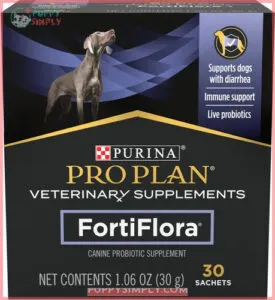
Veterinarians routinely trust this powerhouse supplement to restore your dog’s digestive balance during yeast infections.
ProPlan Ingredients include Enterococcus faecium, proven effective for dog digestive health restoration.
FortiFlora Benefits extend beyond basic probiotic support – it’s specifically formulated for dogs with compromised gut health.
This vet recommended supplement offers precise supplement dosage guidelines, making treatment straightforward, and the brand reputation speaks volumes about reliability for probiotics for dogs yeast issues, with a strong focus on digestive health and yeast infections.
3. Native Pet Vet Formulated Probiotic Prebiotic Powder Dog Supplement
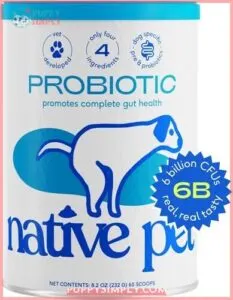
Native Pet’s vet formulation stands out with its powder benefits for easy mixing into your dog’s food.
This dog yeast infection treatment combines probiotics for dogs yeast with prebiotics, creating a powerful duo for dog digestive health.
Key Features:
- Vet Formulation – Veterinarian-developed blend targets yeast overgrowth specifically
- Prebiotic Inclusion – Feeds beneficial bacteria for enhanced dog probiotics benefits
- Palatability Factors – Unflavored powder mixes seamlessly into any meal
- Dosage Guidelines – Simple scoop measurements based on your dog’s weight
4. Nutri Vet Digestive Prebiotics Probiotics Dog Supplement Soft Chews
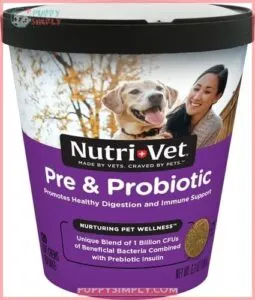
These power-packed probiotics pack 1 Billion CFUs of beneficial bacteria cultures combined with Prebiotic Inulin.
The liver and cheese flavor makes dosage guidelines easy—dogs love these chews.
Their healthy digestion support and immune system boost targets yeast infections effectively.
Probiotics with Lactobacillus and Bifidobacterium strains can aid in digestion.
| Feature | Nutri Vet Benefits |
|---|---|
| Key ingredients | 1 Billion CFUs + Prebiotic Inulin |
| Chew palatability | Liver & cheese flavor |
| Cost analysis | Mid-range pricing for quality |
5. PetLab Probiotic Pork Flavored Soft Chews Digestive Supplement Dogs 30 Count
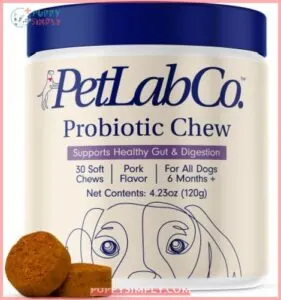
Something special about PetLab’s offering makes it stand out for busy pet parents.
These pork-flavored soft chews deliver targeted digestive health support in convenient 30-count packaging.
Your dog will think they’re getting treats while receiving powerful probiotics for yeast control.
- Pork flavor appeals to even picky eaters
- Soft chews eliminate dosing struggles
- Multi-strain formula targets yeast overgrowth
- 30-count package provides monthly supply
- Easy supplement use fits daily routines
6. Fera Pet Organics Probiotics Prebiotics for Dogs Cats
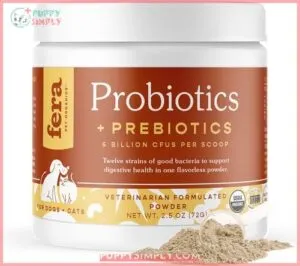
Fera Pet Organics delivers dual-species support with organic ingredients that work for both cats and dogs.
This brand reputation stems from their prebiotic synergy approach, combining probiotics for yeast control with organic prebiotics that feed beneficial bacteria naturally.
| Feature | Benefit |
|---|---|
| Organic Ingredients | Chemical-free formula safe for sensitive pets |
| Dual-Species Formula | Works for both dogs and cats effectively |
| Prebiotic Synergy | Feeds good bacteria for lasting results |
| Brand Reputation | Trusted by pet owners for quality assurance |
7. Herbsmith Microflora Digestion Capsules Dog Cat Supplement
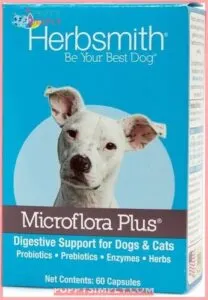
When you’re looking beyond surface-level solutions, Herbsmith Microflora offers veterinarian-formulated capsules containing beneficial bacteria strains specifically targeting canine probiotics for yeast infections.
Key features that set this pet probiotics for yeast infections supplement apart:
- Herbsmith Ingredients – Contains Lactobacillus acidophilus and Bifidobacterium longum for thorough gut health
- Capsule Benefits – Easy-to-administer format that preserves probiotic viability better than powders
- Dosage Guidelines – Clear instructions based on your dog’s weight for maximum effectiveness
- Cat Supplement compatibility makes it versatile for multi-pet households
- Brand Reputation – Herbsmith’s 20+ year history in holistic pet care guarantees quality dog health supplements for yeast
This dog yeast infection remedies option provides targeted support for digestive balance and immune function.
8. Honest Kitchen Daily Boosters Goats Milk Probiotics Dog
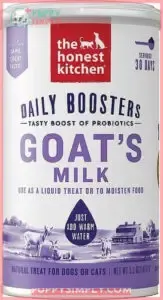
After these goat milk probiotics, you’ll wonder why you weren’t using them sooner. This Supplement Form delivers 5 billion CFU Count in powder format, making Booster Palatability a real winner for canine yeast infections.
| Feature | Benefit | Perfect For |
|---|---|---|
| Goat milk base | Easy digestion | Sensitive stomachs |
| 5 billion CFUs | Strong probiotic power | Pet yeast infections |
| Powder format | Mix with food | Picky eaters |
The Honest Kitchen Quality shines through with highly-digestible dehydrated goat’s milk plus probiotics and digestive enzymes. These dog probiotics for yeast help restore balance while delivering Goat Milk Benefits that support overall gut health.
Selecting The Best Probiotic
When you’re choosing probiotics for your dog’s yeast infection, you’ll want to focus on specific strains that actually fight yeast rather than just any probiotic supplement.
Look for products containing Bacillus coagulans, Lactobacillus rhamnosus, or Saccharomyces boulardii since research shows these strains can break down yeast cell membranes and restore healthy gut balance in dogs.
Dog-Specific Strains Needed
The canine gut microbiome differs substantially from humans, requiring dog-specific strains like Lactobacillus animalis and Enterococcus faecium for ideal yeast control.
These canine-adapted probiotics colonize better and show superior strain effectiveness against yeast infections.
Veterinary recommendations emphasize choosing products with verified dog-origin bacteria rather than generic human formulas for better results.
Some probiotics, like Purina’s digestive supplement, are vet-recommended.
Product Potency Important
Potency matters when choosing dog probiotics for yeast infections.
Look for products with guaranteed CFU counts of at least 1 billion per dose.
Strain diversity boosts effectiveness—multi-strain formulas work better than single strains.
Check for viability testing and shelf stability guarantees.
Understanding dog probiotic potency is key to effectiveness.
Without proper CFU counts, you’re basically feeding your pup expensive treats instead of effective canine yeast infection treatment.
Delivery Method Matters
Your dog’s digestive system works differently than yours, so delivery methods affect how well dog probiotics for yeast infections actually work.
Chews vs. powder matters because powder mixes better with food, improving absorption rates. However, palatability concerns often make chews the winner since most dogs treat them like snacks.
Considering that, you might want to explore dog probiotic options.
Food compatibility varies too – some canine yeast infection treatment powders clump in wet food, affecting treatment success.
Owner convenience plays a role in consistency, which directly impacts your pet yeast infection treatment success, and the overall effectiveness of dog probiotics.
Vet Consultation Recommended
Wisdom lies in seeking professional guidance before starting dog probiotics for yeast infections.
Your vet provides personalized treatment plans based on your dog’s specific needs and underlying conditions.
Here’s why veterinary advice matters:
- Professional diagnosis – Confirms yeast infection versus other skin conditions
- Dosage accuracy – Determines correct probiotic strength for your dog’s weight
- Underlying conditions – Identifies allergies or health issues affecting treatment
- Monitoring progress – Tracks improvement and adjusts canine probiotics for yeast accordingly
- Safety screening – Guarantees pet probiotics for yeast won’t interact with current medications
Your vet knows dog yeast infection solutions that work best for your specific situation.
Managing Yeast Infections Effectively
You’ve chosen the right probiotics, but proper timing and dosage make all the difference in beating yeast infections for good.
Combining probiotics with other targeted treatments creates a thorough approach that tackles yeast from multiple angles while supporting your dog’s long-term health.
Probiotic Supplement Guidelines
Follow your veterinarian’s dosage guidelines when starting probiotics for dogs with yeast infections.
Store supplements in cool, dry places per storage recommendations. Mix powder forms into food for easier administration tips.
Monitor progress weekly for improvements in symptoms. Watch for potential side-effects like digestive upset.
Start slowly to help your dog’s system adjust to the beneficial bacteria.
Other Treatments for Dog Yeast Infections
Beyond probiotics, several proven treatments tackle yeast infections in dogs effectively.
Your vet might recommend combining approaches for stubborn cases that resist single-therapy solutions.
- Antifungal Medications: Prescription drugs like fluconazole target yeast directly, while topical treatments provide localized relief
- Dietary Changes: Eliminating sugar-rich foods starves yeast colonies, supporting your dog’s natural immune response
- Bathing Regimen: Medicated shampoos with antifungal properties help cleanse affected skin areas thoroughly.
Many owners find prescription dog treatments helpful for combating yeast.
Prognosis for Dog Yeast Infections
With proper treatment, your dog’s yeast infection typically clears within two to four weeks.
Long-term Outlook remains positive when you address Recurrence Factors like allergies or immune issues.
Quality of Life improves substantially with dog probiotics for yeast and consistent Preventative Measures.
However, Complication Risks increase without treatment, making dog yeast infection supplements and ongoing dog health and yeast infections monitoring essential.
Frequently Asked Questions (FAQs)
What is the best probiotic for dogs with yeast infections?
You’ll want multi-strain probiotics with Bacillus coagulans, Lactobacillus rhamnosus, and Saccharomyces boulardii. These strains specifically target yeast overgrowth while supporting your dog’s gut health and immune system effectively.
What kills yeast in the gut for dogs?
Specific probiotic strains like Lactobacillus rhamnosus and Bacillus coagulans actively break down yeast cell walls, while Saccharomyces boulardii helps restore your dog’s gut balance and reduce harmful yeast overgrowth naturally.
What do vets recommend for yeast infection in dogs?
Vets typically recommend antifungal medications like ketoconazole or fluconazole for yeast infections.
They’ll also suggest medicated shampoos, topical treatments, and probiotics to restore healthy gut bacteria that naturally fights yeast overgrowth.
Can puppies safely take yeast-fighting probiotics?
Puppies can safely take specific yeast-fighting probiotics after 8-12 weeks old.
You’ll want gentle strains like Lactobacillus rhamnosus or Bifidobacterium lactis.
Start with lower doses than adult recommendations and consult your vet first.
How long before probiotics reduce yeast symptoms?
Studies show 75% of dogs see improvement within 2-4 weeks of consistent probiotic use. You’ll typically notice reduced itching and odor first, followed by skin healing over the following weeks.
Are human probiotics safe for dogs?
You shouldn’t give your dog human probiotics since they’re formulated differently and may contain ingredients that could upset your pup’s stomach or cause digestive issues.
Do probiotics prevent recurring yeast infections?
Yes, probiotics can help prevent recurring yeast infections in your dog.
Multi-strain formulations with Lactobacillus and Bacillus species work best by maintaining healthy gut bacteria balance and inhibiting yeast overgrowth through consistent daily supplementation, which involves maintaining a balance.
Can probiotics replace antifungal medications completely?
Probiotics can’t completely replace antifungal medications for severe yeast infections. They’re excellent for prevention and mild cases, but serious overgrowth needs targeted antifungal treatment alongside probiotic support for best results.
Conclusion
Choosing the right probiotics transforms your dog’s battle against yeast into a manageable victory.
The best dog probiotics for yeast infections require specific strains like Lactobacillus acidophilus and Bifidobacterium animalis, plus adequate CFU counts to survive stomach acid.
Whether you select powder supplements or soft chews, consistency matters most.
Your veterinarian can guide dosing based on your dog’s specific needs.
With proper probiotic support, you’re not just treating symptoms—you’re rebuilding your pup’s natural defenses for lasting digestive health.

